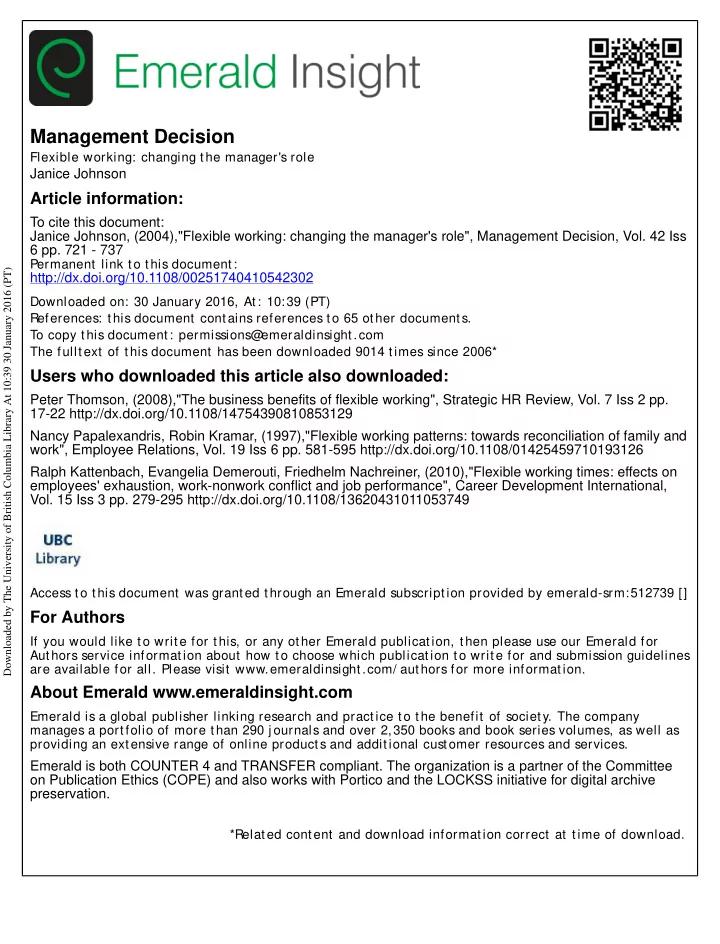

Management Decision Flexible working: changing the manager's role Janice Johnson Article information: To cite this document: Janice Johnson, (2004),"Flexible working: changing the manager's role", Management Decision, Vol. 42 Iss 6 pp. 721 - 737 Permanent link to this document: Downloaded by The University of British Columbia Library At 10:39 30 January 2016 (PT) http://dx.doi.org/10.1108/00251740410542302 Downloaded on: 30 January 2016, At: 10:39 (PT) References: this document contains references to 65 other documents. To copy this document: permissions@ emeraldinsight.com The fulltext of this document has been downloaded 9014 times since 2006* Users who downloaded this article also downloaded: Peter Thomson, (2008),"The business benefits of flexible working", Strategic HR Review, Vol. 7 Iss 2 pp. 17-22 http://dx.doi.org/10.1108/14754390810853129 Nancy Papalexandris, Robin Kramar, (1997),"Flexible working patterns: towards reconciliation of family and work", Employee Relations, Vol. 19 Iss 6 pp. 581-595 http://dx.doi.org/10.1108/01425459710193126 Ralph Kattenbach, Evangelia Demerouti, Friedhelm Nachreiner, (2010),"Flexible working times: effects on employees' exhaustion, work-nonwork conflict and job performance", Career Development International, Vol. 15 Iss 3 pp. 279-295 http://dx.doi.org/10.1108/13620431011053749 Access to this document was granted through an Emerald subscription provided by emerald-srm:512739 [] For Authors If you would like to write for this, or any other Emerald publication, then please use our Emerald for Authors service information about how to choose which publication to write for and submission guidelines are available for all. Please visit www.emeraldinsight.com/ authors for more information. About Emerald www.emeraldinsight.com Emerald is a global publisher linking research and practice to the benefit of society. The company manages a portfolio of more than 290 j ournals and over 2,350 books and book series volumes, as well as providing an extensive range of online products and additional customer resources and services. Emerald is both COUNTER 4 and TRANSFER compliant. The organization is a partner of the Committee on Publication Ethics (COPE) and also works with Portico and the LOCKSS initiative for digital archive preservation. *Related content and download information correct at time of download.
The Emerald Research Register for this journal is available at The current issue and full text archive of this journal is available at www.emeraldinsight.com/researchregister www.emeraldinsight.com/0025-1747.htm Flexible working Flexible working: changing the manager’s role Janice Johnson School of Business, De Montfort University, Bedford, UK 721 Keywords Flexible working, Employees attitudes, Job commitment, Line managers Abstract There are no guarantees of anything in life except death and taxation and so in the meantime organisations must respond to the dynamic changes thrust upon them in order to ensure Downloaded by The University of British Columbia Library At 10:39 30 January 2016 (PT) a means of survival and continuity. The last century saw many changes in work itself and the practice of work. The trend continues into this century where it is almost impossible to visualise how one will be working and in what areas. Yet one needs to have a vision of the future organisation and the future worker in order to begin to manage the necessary structural, technological and psychological changes involved. This paper explores aspects of the changing nature of work and some of the strategies organisations are using to help manage a more demanding (for leisure time and shorter/flexible working hours) worker. It will also examine the changing role of line managers as they attempt to manage the atypical worker and solicit their commitment. Implications and conclusions will highlight the challenges faced by organisations and their workers. Introduction Slack (1991) argues that the search for lean and mean competitive forms, simultaneously delivering goods and services which are “right first time, quickly on time, cheaply and flexibly”, has triggered the quest for futuristic competitive organisational forms. For example the emergence of the “hollow corporation”, dedicated to minimising internal and external transaction costs. When traditional ways of working are eroded what then happens to the traditional ways of managing performance in the organisation? The future organisation then necessitates and has to facilitate, the perceived future worker and it is the task of managing these new age workers, in a new way, which is the challenge for line managers. Work according to Terkel (1977), is about a search for daily meaning as well as daily bread, for recognition as well as cash, for astonishment rather than torpor, in short, for a sort of life rather than a Monday to Friday sort of dying. It is “this sort of dying” that organisations must seek to avoid. In their quest for a flexible, motivated, committed and willing workforce, success factors must be placed upon good people management practices and positive psychological contracts which may then result in the desired productivity, profitability and agility (Institute of Personnel and Development (IPD), 1994). In the field of organisational behaviour there is reassurance from two factors: there will persist in being a change from the past as well as continuity with the past. Work in a Western capitalist society is no exception. Noon and Blyton (1997) suggest there have been new theories, ideas, technologies and practices replacing the old ones, while there have continued to be important resonance with the past. An example of the changing realities of work is, they suggest, new working life patterns. This means the traditional hours of 9.00am-5.00pm, five days per week, from leaving school until retirement at 65 Management Decision Vol. 42 No. 6, 2004 years old, is no longer (assuming it ever was) the dominant pattern of employment. For pp. 721-737 the employer and for the employee, this can mean flexibility – it can also mean q Emerald Group Publishing Limited 0025-1747 previously uncharted challenges, as both parties attempt to create a working DOI 10.1108/00251740410542302
Recommend
More recommend